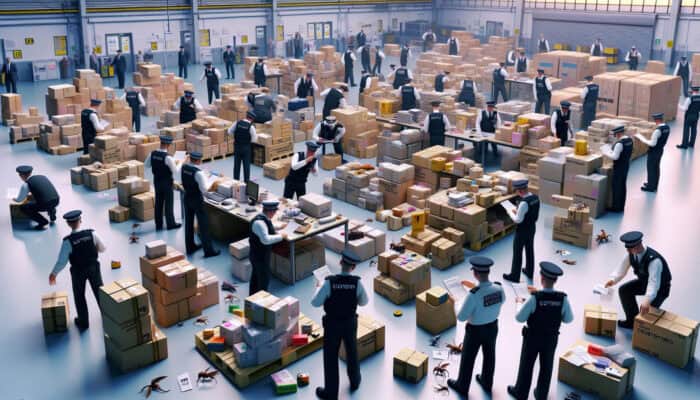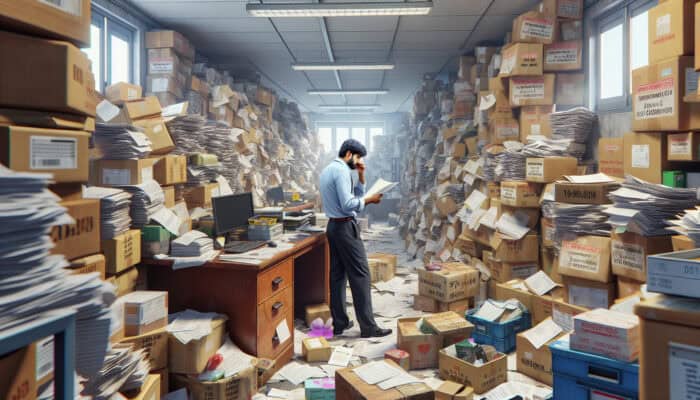Essential Steps for Successfully Navigating UK Clearance Procedures
What Are the Key Steps to Successfully Manage UK Clearance?

Successfully managing the clearance of legal items in the UK requires careful adherence to a series of critical steps. These steps are designed to ensure compliance with stringent regulations, making the process of importation or exportation of goods as seamless as possible. It is essential for all stakeholders involved in handling legal items during UK clearance to be well-acquainted with these steps. The following is a detailed outline of the necessary actions to be taken during the UK clearance process:
- Preparation of all required documents and supportive information.
- Submission of a complete and detailed Customs Declaration.
- Payment of applicable duty and taxes.
- Customs inspection, if required by the circumstances.
- Obtaining clearance approval from UK Customs.
- Delivery of legal items to the specified destination.
- Conducting post-clearance audits when necessary.
Every step listed here is critical to ensure that legal items comply with UK regulations and are processed efficiently. Skipping any of these steps can result in serious delays or hefty fines, highlighting the importance of approaching the clearance process with diligence and expertise.
What Documentation Is Required for Clearing Legal Items?
When it comes to clearing legal items through UK customs, specific documentation is imperative. These documents serve as proof of legitimacy and compliance with UK laws. The essential documentation typically includes:
- Commercial invoices that outline the nature and value of the items.
- Certificates of origin or authenticity to substantiate the item’s background.
- Import licenses, if applicable to the items being cleared.
- Health and safety compliance certificates for certain regulated products.
- Transportation documents, such as bills of lading, to track the shipment.
Each document holds significant importance in the clearance process. For example, a commercial invoice must accurately reflect the transaction details to prevent customs disputes. Similarly, certificates of origin are crucial for determining applicable tariffs. Therefore, meticulous attention to documentation is vital for the clearance of legal items.
Understanding UK Customs and Classifications of Legal Items
Legal items are classified by UK customs into various categories based on their nature, intended use, and specific regulatory requirements. Understanding these classifications is essential for effectively navigating the complexities of the clearance process. Categories of legal items can include pharmaceuticals, machinery, electronics, and firearms, each with unique implications for clearance procedures.
For instance, firearms and ammunition are heavily regulated and require special permits and comprehensive documentation. Conversely, electronic items must adhere to specific safety standards for clearance. Misclassification can result in significant delays and increased scrutiny from customs officials, underscoring the need for accurate categorisation.
What Common Challenges Do Stakeholders Encounter in UK Clearance Procedures?

Engaging with the UK clearance process can present various challenges, especially when handling legal items. Common issues often arise from incomplete documentation, misclassification of items, and a lack of familiarity with customs regulations. For instance, significant delays frequently occur when customs declarations lack the necessary supporting documents or when invoices do not accurately align with the items being declared.
Moreover, customs inspections can add complexity if items are flagged for further examination. Such inspections can prolong clearance times, potentially disrupting supply chains. Understanding these common challenges empowers stakeholders to address them proactively, leading to a more efficient clearance experience.
How Can You Streamline the UK Clearance Process for Legal Items?
To make the UK clearance process for legal items more efficient, stakeholders can adopt several effective strategies. Comprehensive pre-clearance preparation is crucial, beginning with thorough documentation. Ensuring all required documents are complete and accurate before submission significantly reduces the likelihood of delays.
Additionally, familiarising oneself with customs regulations is instrumental in successfully navigating the complex clearance landscape. Engaging customs brokers or legal experts can provide invaluable insights and facilitate the process. Furthermore, utilizing customs software tools can streamline document preparation and submission, contributing to improved overall efficiency. By implementing these strategies, individuals and businesses can enhance their clearance experiences and reduce potential setbacks.
Expert Insights on Managing Legal Items During UK Clearance
What Expertise Is Necessary for Successful Clearance of Legal Items?

Successfully managing the clearance of legal items during UK customs requires specialized skills and extensive knowledge. Expertise in customs regulations, tariff classifications, and documentation requirements is critical for effectively navigating the clearance process. Professionals in this field must also be adept at understanding the nuances associated with different item categories and their respective legal obligations.
Key skills essential for success include:
- In-depth knowledge of UK customs law and procedures.
- Experience in preparing and submitting accurate customs declarations.
- Proficiency in identifying and categorising various legal items.
- Strong problem-solving abilities to address issues that arise during clearance.
- Effective communication skills for liaising with customs officials and stakeholders.
The combination of these skills enables experts to navigate the complexities of the clearance process efficiently. For example, a customs broker with a nuanced understanding of regulations can expedite the clearance of sensitive items, ensuring compliance while minimizing delays.
How Can Experts Enhance the Clearance Process for Legal Items?
Experts play a crucial role in streamlining the clearance of legal items in the UK. Their actionable insights can significantly improve the efficiency of the process. One key strategy involves engaging experienced customs brokers who specialize in handling legal items. These professionals provide guidance on the necessary documentation, suitable classifications, and regulations that must be adhered to during clearance.
Moreover, experts can conduct training sessions for businesses to ensure employees understand the intricacies of customs processes. Implementing technology solutions, such as automated customs declaration software, can further expedite the clearance process. By leveraging expert knowledge, stakeholders can minimize errors and enhance compliance, ultimately facilitating smoother operations.
What Common Challenges Do Experts Face in UK Clearance Procedures?
Despite possessing the expertise to effectively navigate UK clearance procedures, experts often encounter challenges that can hinder the clearance of legal items. One common hurdle is the constantly evolving landscape of customs regulations, necessitating ongoing education and adaptation. Staying informed about amendments in laws and compliance requirements can be daunting, even for knowledgeable professionals.
Additionally, experts may face resistance from customs officials when requesting clarifications or adjustments to declarations. In some cases, communication barriers may exacerbate challenges, particularly when discrepancies in documentation arise. By recognizing these obstacles, experts can develop strategies to overcome them, ensuring a more effective clearance process.
Legal Requirements and Compliance in UK Clearance Explained
What Are the Fundamental Legal Requirements for Clearance of Legal Items?
Clearing legal items through UK customs necessitates adherence to a specific set of legal obligations designed to ensure compliance and safety. Key requirements include:
- Submission of accurate and complete customs declarations.
- Payment of any applicable duties and taxes associated with the items.
- Provision of necessary supporting documentation to validate the items.
- Compliance with prevailing safety and health regulations.
- Adherence to import and export licensing requirements based on the nature of the goods.
Failure to meet these legal obligations can result in hefty penalties and complications during the clearance process. Stakeholders must ensure that all processes and documentation align with legal requirements to minimize the risks associated with non-compliance.
How Can Stakeholders Ensure Compliance with UK Customs Regulations?
To ensure compliance with UK regulations during the clearance of legal items, stakeholders must adopt a proactive approach. Familiarizing themselves with customs laws and regulations, which can often be intricate and vary by item type, is essential.
Regular training sessions for staff involved in the clearance process can yield significant benefits. Staying updated on changes in customs legislation is critical, as non-compliance can lead to financial penalties and delays. Furthermore, leveraging expert customs brokers can provide peace of mind, ensuring that every aspect of the clearance process adheres to legal standards.
What Are the Consequences of Non-Compliance with UK Customs Regulations?
Non-compliance with UK clearance regulations can have serious repercussions for both businesses and individuals. Potential penalties may include substantial fines, the seizure of goods, and even legal actions, depending on the severity of the infraction. For instance, inaccurate customs declarations can lead to significant financial penalties, while persistent non-compliance may result in heightened scrutiny from customs officials in future transactions.
Additionally, delays caused by non-compliance can disrupt supply chains and erode customer trust. Understanding the implications of these penalties underscores the importance of thorough preparation and adherence to UK customs regulations throughout the clearance process.
What Recent Changes Have Occurred in UK Customs Legislation Impacting Clearance?
The landscape of UK customs legislation is continually evolving, with recent changes affecting clearance procedures and compliance requirements. Following Brexit, the UK has introduced new customs rules that necessitate adjustments in how legal items are cleared. Stakeholders must now navigate additional documentation and procedures, especially concerning goods imported from EU countries.
Furthermore, there has been heightened emphasis on compliance and safety standards, accompanied by stricter penalties for non-compliance. Remaining knowledgeable about these changes is crucial for ensuring a smooth clearance process while avoiding pitfalls associated with outdated practices.
How Clearance Processes Differ Based on Item Type in the UK
What Legal Items Require Special Handling During Clearance?
Certain legal items require special handling during the UK clearance process due to their nature and specific regulatory requirements. Categories of such items include:
- Firearms and ammunition, which necessitate specific licenses and comprehensive documentation.
- Pharmaceuticals, which are subject to stringent safety and health regulations.
- Hazardous materials that must comply with environmental regulations.
- Artwork and antiques that may require provenance documentation to verify authenticity.
These items often face additional scrutiny and may require specialized knowledge and expertise during the clearance process. Understanding the specific requirements for these categories is vital for ensuring compliance and facilitating a smooth clearance experience.
What Procedures Are Involved in Handling Sensitive Items During Clearance?
Clearing sensitive legal items through UK customs involves a series of specific steps and protocols that must be meticulously followed. For firearms, it is imperative to possess the correct firearms certificate and to provide detailed documentation to customs officials. Similarly, pharmaceuticals require comprehensive documentation, including clinical trial data and adherence to safety protocols.
Furthermore, hazardous materials must be accurately classified, and handlers must ensure that safety data sheets accompany the shipment. Engaging experts familiar with the intricacies of these categories can facilitate the process, ensuring that all procedures are executed meticulously to avoid delays.
What Are the Typical Timeframes for Different Item Types During Clearance?
The timeframes for clearing various types of legal items through UK customs can vary significantly based on several factors, including the nature of the items and the completeness of the documentation provided. Generally, straightforward items like electronics can clear customs within a few days, assuming all paperwork is in order and complies with regulations.
In contrast, more sensitive items such as firearms or pharmaceuticals may take longer due to additional documentation requirements and scrutiny. Customs inspections can also prolong clearance times, particularly if discrepancies or concerns arise regarding the shipment. Understanding these timeframes is crucial for stakeholders to effectively manage expectations and logistics.
Effective Strategies for Handling Legal Items During UK Clearance
What Strategies Are Most Effective for Successful Clearance of Legal Items?
Navigating the complexities of clearing legal items through UK customs can be streamlined through well-established strategies. One highly effective approach is to engage experienced customs brokers who can guide the clearance process and ensure compliance with all regulations. These professionals possess the expertise to anticipate potential issues, greatly reducing the chance of delays.
Another proven strategy is to maintain comprehensive records of all transactions and communications with customs. Documentation serves as an invaluable resource in the event of disputes or inquiries. Additionally, businesses should consider investing in automated customs declaration software to improve accuracy and efficiency during submissions. This tech-forward approach can significantly enhance the overall clearance experience.
How to Optimise the Clearance Process for Legal Items in the UK?
Optimizing the clearance process for legal items in the UK requires a multifaceted approach. Pre-clearance preparation is paramount; stakeholders should ensure that all necessary documentation is complete and accurate prior to submission. Conducting internal audits of documentation practices can help identify areas for improvement.
Moreover, training employees on customs regulations and compliance best practices is essential. Emphasizing the importance of accuracy in declarations can help prevent costly delays. Engaging with customs brokers can also streamline the process, as their expertise can assist in navigating complex situations effectively.
What Tools and Resources Are Available to Support UK Clearance Efforts?
A variety of tools and resources are available to assist with the clearance of legal items in the UK. Customs management software offers an efficient way to manage documentation and track shipment statuses. Such software typically includes features for compliance checks, which can significantly reduce errors.
Additionally, HM Revenue and Customs (HMRC) provides online resources detailing customs regulations and procedures. Stakeholders may also benefit from professional organizations and trade associations that offer training, resources, and networking opportunities. Leveraging these tools and resources enhances the clearance process and fosters compliance.
Key Benefits of Efficient UK Clearance for Legal Items
How Does Efficient Clearance Positively Impact Businesses?
Achieving an efficient UK clearance process offers numerous advantages for businesses dealing with legal items. Streamlined clearance reduces the time goods spend in customs, facilitating faster delivery to customers and enhancing overall supply chain efficiency. This efficiency often translates into improved customer satisfaction, as timely delivery is a crucial aspect of maintaining a competitive edge in the market.
Moreover, businesses that effectively navigate the clearance process can lower storage fees and demurrage costs. By avoiding delays and ensuring compliance, companies can cultivate positive relationships with customs officials, potentially streamlining future transactions.
What Are the Time and Cost Savings Associated with Efficient Clearance?
Efficient clearance processes translate directly into significant time and cost savings for both importers and exporters in the UK. The quicker items clear customs, the less time they spend in storage, ultimately leading to reduced overhead costs. For example, lengthy delays can incur storage charges that adversely affect profit margins.
Additionally, minimising errors and ensuring compliance reduces penalties and disputes, which can be financially burdensome. Businesses that prioritize optimizing their clearance processes frequently experience a decrease in operational costs, ultimately enhancing their bottom line. Therefore, focusing on efficiency yields tangible financial benefits.
How Does Efficient Clearance Enhance Customer Satisfaction?
The effective clearance of legal items significantly correlates with customer satisfaction. Timely delivery and service reliability greatly influence a customer’s perception of a business. When businesses manage the clearance process efficiently, customers receive their items promptly, fostering trust and loyalty.
Moreover, clear communication regarding shipment status can further boost customer satisfaction. By keeping customers informed, businesses can alleviate concerns about delays or complications during the clearance process. Ultimately, efficient clearance processes contribute to a positive customer experience, reinforcing the reputation of UK-based businesses.
Real-World Case Studies of Successful Clearance of Legal Items
What Are Examples of Successful Clearance of Legal Items in the UK?
Numerous examples illustrate successful clearance processes for legal items in the UK, showcasing best practices and effective strategies. A notable case involved a company specializing in the importation of medical devices. By engaging a knowledgeable customs broker, the company ensured that all necessary documentation was prepared, including health compliance certifications.
The clearance process was completed within days rather than weeks, enabling the company to maintain a steady supply of essential products to healthcare providers. This case highlights the importance of expertise in navigating the complexities of customs regulations and demonstrates how effective collaboration can yield successful outcomes.
What Lessons Can Stakeholders Learn from Case Studies of Clearance Success?
Case studies provide invaluable insights into the intricacies of the UK clearance process, revealing strategies that contribute to success. One critical lesson from successful clearance scenarios is the importance of comprehensive documentation and thorough pre-clearance preparation. Stakeholders who invest time in ensuring accuracy and completeness frequently enjoy smoother clearance processes.
Another significant takeaway is the value of expert guidance. Engaging customs brokers and legal advisors can offer a wealth of knowledge and mitigate the risk of errors. Furthermore, fostering open communication with customs officials can enhance relationships and expedite the resolution of potential issues.
How Have UK Clearance Processes Evolved Over Time?
Over the years, clearance processes for legal items in the UK have experienced significant changes, largely driven by technological advancements and shifts in regulatory frameworks. Historically, manual processes prevailed, often resulting in delays and increased errors. However, the implementation of digital customs systems has transformed the landscape, enabling more efficient submission and tracking of customs declarations.
Additionally, the introduction of comprehensive compliance requirements has prompted businesses to adopt more rigorous documentation practices. The evolving nature of customs regulations necessitates that stakeholders continuously adapt to ensure compliance within a dynamic environment.
What Is the Impact of Technology on Clearance Efficiency?
Technological advancements have played a pivotal role in enhancing the efficiency of clearance processes for legal items in the UK. The shift toward electronic customs declarations allows for real-time tracking and updates, significantly reducing the time spent in customs. Automated systems can flag inconsistencies in documentation, diminishing the likelihood of delays caused by errors.
Moreover, innovations such as blockchain technology could enhance transparency and security in the clearance process. By securely documenting each step of the shipment journey, businesses can build trust and accountability, facilitating smoother interactions with customs officials.
What Persistent Challenges Exist in UK Clearance Processes?
Despite advancements in technology and evolving practices, common obstacles continue to exist in the clearance of legal items in the UK. One prevalent challenge is the complexity of customs regulations, which vary considerably by item type. This complexity often results in confusion and potential errors in documentation.
Furthermore, ongoing changes to regulations following Brexit have left many businesses struggling to adapt. The uncertainty surrounding compliance can lead to increased scrutiny from customs officials, potentially causing delays. Recognizing and addressing these challenges through training, resources, and expert guidance is essential for ensuring efficient clearance processes.
Utilising Technology and Innovation in UK Clearance
What Technological Advances Are Beneficial for Clearance Processes?
Recent technological innovations have substantially improved the clearance processes for legal items in the UK. A major advancement is the development of electronic customs declaration systems, which streamline the submission process and enhance accuracy. These systems automate document validation, significantly reducing the risk of human error.
Additionally, cloud-based platforms facilitate real-time shipment tracking, enabling stakeholders to monitor status throughout the clearance process. This transparency enhances communication and fosters trust between businesses and customs officials. As technology continues to advance, its impact on the clearance process is expected to grow, leading to even more efficient practices.
How Can Businesses Leverage Technology for Improved Clearance?
Effectively leveraging technology can markedly enhance the clearance process for legal items in the UK. Businesses should consider investing in automated customs software that simplifies the declaration process. Such solutions minimize manual data entry, thus reducing errors and expediting approvals.
Furthermore, implementing data analytics tools can help identify trends and patterns in clearance processes, allowing businesses to optimize their strategies. Regular training on emerging technologies ensures that employees remain proficient in utilizing these tools effectively, thereby enhancing operational efficiency.
What Future Trends Are Expected in Clearance Technology?
Looking ahead, several trends are anticipated to shape the future of clearance technology in the UK. The integration of artificial intelligence (AI) and machine learning is expected to enhance predictive analytics, enabling customs authorities and businesses to anticipate challenges before they arise. Such proactive approaches can minimize delays and streamline operations.
Moreover, advancements in blockchain technology may revolutionize transparency in the clearance process by enabling secure and immutable records of shipments. This shift could improve compliance and reduce fraud, ultimately benefiting all stakeholders involved in the clearance of legal items.
What Are Examples of Successful Technology Implementation in Clearance?
Numerous case studies illustrate how technology has been effectively implemented to streamline clearance processes for legal items in the UK. One notable example involved a logistics company that integrated an automated customs declaration system, resulting in a 30% reduction in clearance times and significantly enhancing service levels and customer satisfaction.
Another case study highlighted a pharmaceutical importer that utilized data analytics to optimize its compliance strategies. By analysing historical clearance data, the company identified patterns that led to more efficient documentation practices. These examples underscore the transformative potential of technology in enhancing clearance efficiency.
Preparing Effectively for UK Clearance of Legal Items
What Preparations Are Critical Before Initiating Clearance of Legal Items?
Prior to initiating the clearance of legal items through UK customs, several critical preparations are essential for ensuring a smooth process. First and foremost, stakeholders should compile all necessary documentation, including commercial invoices, certificates of origin, and any required licenses. Ensuring the completeness and accuracy of these documents is vital for avoiding delays.
Additionally, familiarising oneself with specific regulations governing the type of items being cleared can prevent compliance issues. Conducting pre-clearance checks and audits can help identify potential discrepancies before submission. By being proactive in their preparations, stakeholders can significantly streamline the clearance process.
How Can You Select the Right Customs Broker for Clearance?
Choosing an appropriate customs broker is a decision that can greatly influence the success of the clearance process for legal items. When selecting a customs broker, stakeholders should consider their expertise in managing the specific types of items involved. Evaluating their track record and reputation within the industry is also essential.
Open communication is vital; stakeholders should assess how well the broker comprehends their unique needs and challenges. Furthermore, ensuring that the broker is well-versed in current UK customs regulations will facilitate smoother transactions. Ultimately, selecting the right customs broker can significantly enhance the efficiency of the clearance process.
What Actions Should Be Taken If Issues Arise During Clearance?
If issues arise during the clearance of legal items through UK customs, it is essential to promptly and effectively address them. First, stakeholders should communicate directly with their customs broker and customs officials to clarify the nature of the issue. Understanding the specifics can provide insights into potential resolutions.
Additionally, reviewing all submitted documentation can help identify discrepancies or errors that may have triggered the issue. Engaging legal counsel or customs experts can also provide valuable guidance on navigating complex situations. By acting swiftly and collaboratively, stakeholders can resolve issues efficiently and minimize disruptions to the clearance process.
Frequently Asked Questions (FAQs) about UK Clearance
What Role Does a Customs Broker Play in UK Clearance Procedures?
A customs broker acts as an intermediary between businesses and customs authorities, ensuring that all documentation is accurate and complete for the legal clearance of items.
What Types of Legal Items Require Special Documentation for Clearance?
Items such as firearms, pharmaceuticals, and hazardous materials require specific permits and documentation to comply with UK customs regulations.
How Long Does It Usually Take to Clear Goods Through UK Customs?
The time required to clear goods can vary widely; straightforward items may clear in a few days, while sensitive items may take longer due to additional scrutiny.
What Penalties Can Result from Incorrect Customs Declarations?
Penalties may include fines, seizure of goods, and increased scrutiny in future transactions, highlighting the necessity of accurate declarations.
How Can Businesses Ensure Compliance with UK Customs Regulations?
Businesses should invest in training, utilize expert customs brokers, and stay updated on changes in customs regulations to ensure compliance.
What Should I Do If My Shipment Is Delayed at Customs?
If a shipment is delayed, contact your customs broker for clarification and review all documentation for potential discrepancies that may have caused the delay.
Are There New Customs Regulations Post-Brexit That Affect Clearance?
Yes, following Brexit, new customs rules have been implemented, affecting documentation and procedures for items imported from the EU.
What Technology Can Assist with Customs Clearance?
Automated customs declaration software and cloud-based tracking platforms greatly enhance the efficiency and accuracy of the customs clearance process.
How Can I Prepare for UK Customs Clearance?
Preparation involves compiling all necessary documentation, understanding specific regulations for the items, and conducting pre-clearance audits.
What Factors Contribute to Delays in the Clearance Process?
Delays often arise from incomplete documentation, misclassification of items, or additional customs inspections triggered by discrepancies in the submission.
Connect with us on Facebook!
The Article: Handling Legal Items During UK Clearance: Essential Guide Was First Found At https://birminghamhouseclearance.com
The Article Legal Items During UK Clearance: Your Essential Guide Was Found On https://limitsofstrategy.com


